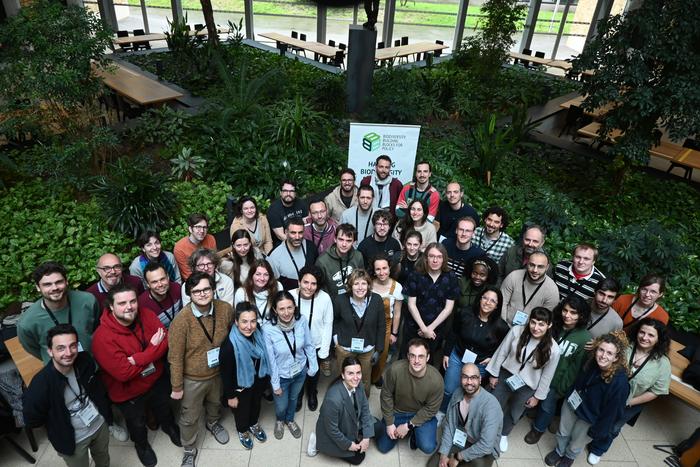B-Cubed’s Hackathon – “Hacking Biodiversity Data Cubes for Policy” – concluded successfully on 5 April in Brussels. The event marked a significant milestone in the use of data cubes for enhancing biodiversity data analysis and policy-making. Over four days, participants from diverse backgrounds collaborated to explore innovative solutions aimed at standardising and improving the accessibility of biodiversity data.

Credit: B-Cubed Project
B-Cubed’s Hackathon – “Hacking Biodiversity Data Cubes for Policy” – concluded successfully on 5 April in Brussels. The event marked a significant milestone in the use of data cubes for enhancing biodiversity data analysis and policy-making. Over four days, participants from diverse backgrounds collaborated to explore innovative solutions aimed at standardising and improving the accessibility of biodiversity data.
The event began with a foundational presentation on data cubes by Andrew Rodrigues from GBIF, preparing participants for the challenges ahead. Ten teams, comprising both coding professionals and enthusiasts, worked diligently on their projects, benefiting from expert panels by Evangelia Drakou (Harokopio University of Athens), Lucy Bastin (Aston University) and Yanina Sica (Justus-Liebig University of Giessen), who provided guidance and insights on various topics.
The Hackathon’s finale was marked by a presentation session where teams showcased their solutions to a jury of experts. Criteria for evaluation included the integration of data cubes, innovation in addressing biodiversity challenges, and the clarity of solution visualisation for policy impact. The following teams were recognised for their outstanding contributions to the field of biodiversity data analysis:
First category: Interoperability and integration
- #9 Species occurrence cube portability
- #10 Effects of integrating species occurrences from different sources into Data Cubes: facilitating detection of data balance, biases, scale and other effects.
- #7 Interoperable eLTER Standard Observation variables for Biosphere
Second category: Monitoring and modelling
- #4 Irokube: Deep-SDM and Critical Habitats Mapping Empowered by Data Cubes
- #6 Phenological Diversity trends by remote sensing-related datacubes
- #5 Tackling Ocean Biodiversity Crisis with Marine Data B-Cubes
Third category: Visualisation and training
- #2+8 Unveiling Ecological Dynamics Through Simulation and Visualization of Biodiversity Data Cubes & Virtual B3 – How reliability and uncertainty of biodiversity sampling affect SDM: build virtual species to cope with real problems!
- #11 GUI for general biodiversity indicators
- #5 Tackling Ocean Biodiversity Crisis with Marine Data B-Cubes
This event emphasised the potential of data cubes in addressing complex biodiversity issues, demonstrating the importance of collaborative problem-solving and cross-disciplinary approaches. The winning projects illustrated the versatility and impact of data cubes in facilitating informed policy-making and biodiversity conservation efforts.
The hackathon surpassed our hopes in creating innovative ideas for the use of biodiversity data cubes!
– Quentin Groom, Meise Botanic Garden, B-Cubed’s coordinator
B-Cubed appreciates the commitment of all participants, experts, and supporting partners involved in the Hackathon. The engagement and outcomes of this event reflect a shared commitment to advancing the understanding and conservation of biodiversity through technological innovation.
Further details about the Hackathon and the participating teams can be found on the B-Cubed website.
—————————————————————————————————————————————————
This project receives funding from the European Union’s Horizon Europe Research and Innovation Programme (ID No 101059592). Views and opinions expressed are those of the author(s) only and do not necessarily reflect those of the European Union or the European Commission. Neither the EU nor the EC can be held responsible for them.
The Hackathon was made possible with the funding of the European Union and the support of the Research Foundation – Flanders (FWO).




